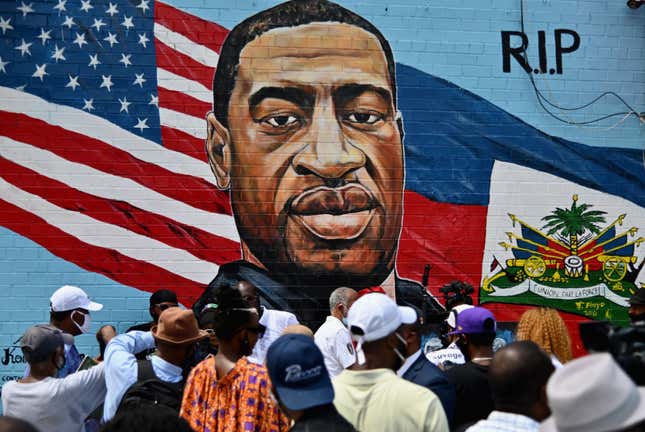
On Wednesday, the New York Times published a piece chronicling the case of George Floyd and the upcoming trial for the ex-Minneapolis police officer accused of killing him, Derek Chauvin. Mostly, the story by the Times was a recap of things that have already been reported regarding the case, but the report did reveal one interesting detail: Chauvin would likely be serving a sentence of more than 10 years right now if not for an early plea deal being quashed by then-Attorney General William Barr.
You might remember that when Chauvin was arrested days after the May 25 killing of Floyd, he was initially charged with third-degree murder before the charge was upgraded to second-degree murder.
What you may not have known is that Chauvin had agreed to plead guilty to third-degree murder and was willing to go to prison for more than a decade under the condition that he serve his time in federal prison and that he would not face federal civil rights charges related to Floyd’s death, according to “new details laid out by three law enforcement officials,” the Times reports. That arrangement never happened because Barr came through at the last minute and said, “Nah.”
From the Times:
An official said Mr. Barr worried that a plea deal, so early in the process and before a full investigation had concluded, would be perceived as too lenient by the growing number of protesters across America. At the same time, Mr. Barr wanted to allow state officials, who were about to take over the case from the county prosecutor who has had tense relations with Minneapolis’s Black community, to make their own decisions about how to proceed.
Here’s the thing: Barr wasn’t wrong.
Ten years in federal prison would never have been enough to satisfy the public’s need to see justice served—it doesn’t come close to the punishment activists and anti-racism advocates across the nation and world (rightfully) believe Chauvin deserves. But Barr’s rejection of a deal that would have ensured Chauvin did serve significant time for Floyd’s murder is still an interesting detail because—what if Chauvin is acquitted of second-degree murder?
There’s a reason why “office workers in downtown Minneapolis have already been told not to come to work during the weekslong trial because of heavy security,” as the Times reports. There’s also a reason why the National Guard could be deployed indefinitely while Chauvin and the three other officers charged in Floyd’s death stand trial.
Pending appeals—including the appealing of Judge Peter A. Cahill’s decision to separate Chauvin’s trial from that of the other charged officers—threaten the chances that Chauvin will be found guilty.
More from the Times:
The three ex-officers who were with Mr. Chauvin during Mr. Floyd’s final minutes — Thomas Lane, who held Mr. Floyd’s legs; J. Alexander Kueng, who was positioned on Mr. Floyd’s back; and Tou Thao, who held off angry bystanders — are scheduled to face trial on aiding and abetting charges in August.
Legal experts, and lawyers involved in the case, say that Judge Cahill’s decision to hold separate trials could benefit Mr. Chauvin — whose lawyer had pushed for a separate trial — because he will no longer have to face the possibility of the other three men pointing the blame at him.
In fact, that has already been playing out behind the scenes: Defense attorneys for those former officers have shifted from crafting strategies built on establishing the culpability of Mr. Chauvin to offering their help to his defense. If Mr. Chauvin were acquitted — a possibility that many officials fear could lead to more upheaval and second-guessing about the failed plea deal — the other three men would likely not face trial at all.
So imagine how people will feel if, instead of Chauvin doing an unsatisfying 10 years or more in prison, the case ends in none of the officers involved in Floyd’s death facing any real consequences at all.
Imagine if former Texas police officer Amber Guyger was acquitted after walking into Botham Jean’s apartment and shooting him to death. People were understandably disappointed that Guyger was only sentenced to 10 years for Jean’s death—and possibly even more disappointed that the judge and Jean’s brother were out here hugging Jean’s killer and shit—but there was no uprising on Jean’s behalf because ultimately, people just didn’t want to see her go scot-free.
Again, I’m not saying Barr’s decision was wrong. I’m just saying that if Chauvin is acquitted, that will leave one hell of a “what if” question on the minds of anyone who would rather see him in prison for a decade than set free entirely.

